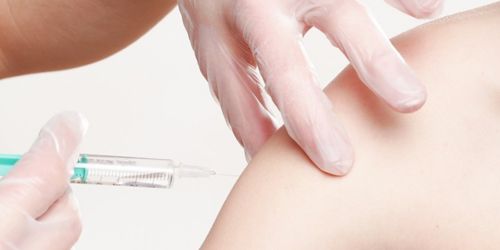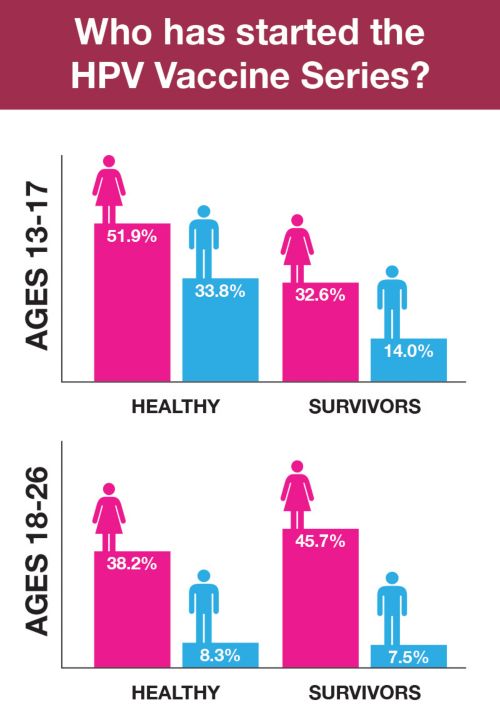St. Jude Family of Websites
Explore our cutting edge research, world-class patient care, career opportunities and more.
St. Jude Children's Research Hospital Home

- Fundraising
St. Jude Family of Websites
Explore our cutting edge research, world-class patient care, career opportunities and more.
St. Jude Children's Research Hospital Home

- Fundraising
A vaccine to prevent cancer? It’s already here.

Cancer doesn’t discriminate. Neither does the human papillomavirus, known as HPV. Nearly everyone is exposed to HPV at some point in their lifetime if they have been sexually active. About 80 million Americans are currently infected.
Once you are diagnosed with HPV, no medications will get rid of it. In most cases, your immune system will likely clear the virus on its own. But if the virus persists in your body, it can lead to several types of cancer.
The best defense? A good offense: a cancer vaccine.
The HPV vaccine – It’s not just for girls
The U.S. Food and Drug Administration (FDA) approved the first HPV vaccine in 2006 for adolescent girls to minimize the risk of cervical cancer, the most common HPV-related cancer. By 2010, the FDA extended vaccine approval to boys. Although only females can get cervical, vaginal and vulvar cancers, males can pass the virus to others and develop other HPV-related cancers, such as throat, penile and anal cancers. Moreover, almost all genital warts can be blamed on HPV.
Currently, there is one vaccine on the market (Gardasil) approved to shield children and adolescents against the nine most dangerous types of HPV. St. Jude joins the U.S. Centers for Disease Control (CDC) and physician organizations like the American Academy of Pediatrics (AAP) in recommending the vaccine for adolescent boys and girls to protect them against future HPV-related cancers and infections. However, the U.S. still lags behind other countries in HPV vaccination rates. Although all teens should receive the vaccine, fewer than half are up to date.
Staying cancer-free in survivorship
Cancer survivors have a higher risk for HPV cancers because they have weakened immune systems. In fact, a previous St. Jude study in PLOS One found childhood cancer survivors have up to a 150% greater risk than the general population for HPV-related cancers, particularly cancers of the head and neck.
Despite this increased risk, St. Jude researchers recently found survivors are less likely to receive the HPV vaccine than other adolescents. Why? Our study found even after treatment is over, survivors look to their doctors for medical recommendations. If the doctor fails to recommend the vaccine, survivors are less likely to start the series.
St. Jude is dedicated to doing all we can to help survivors stay cancer-free. That means our researchers test the HPV vaccine to ensure it is optimal for survivors and just as effective as it is for healthy adolescents. We encourage families to have a conversation with their child’s health care provider about the HPV vaccine. Ask questions and learn how HPV can affect survivor health.

Timing is everything
The HPV vaccine works best when given during pre-adolescence.
Source: Klosky JL, Hudson MM, Chen Y, et al: Human Papillomavirus Vaccination Rates in Young Cancer Survivors. J Clin Oncol 35:3582-3590, 2017
Why so early? You have a better immune response when you’re younger. Also, the vaccine works best when given before you become sexually active and have a chance of being exposed to the virus, which can be spread through many types of sexual contact – including oral sex.
Healthy children ages 9 to 14 should receive two doses of the vaccine. The vaccine can be given at the same time children receive their Tdap and meningococcal injections. Young men and women up to age 26 not previously vaccinated need three doses.
The vaccine series should be completed within about six months, but don’t worry - if your child misses a dose, you can resume the schedule without starting over.
Is it worth it?
A 10-year study published last year in Pediatrics found the HPV vaccine was safe and highly effective. Researchers concluded the vaccine provides long-term protection against the virus when given at the recommended ages.
In addition, DNA research comparing pre-vaccine era samples to post-vaccine era samples shows HPV infection rates have dropped in the United States since the vaccine’s introduction. As vaccination rates increase, we expect HPV rates will go down even further. In turn, this should translate into lower rates of HPV-related cancers in the future.
St. Jude and our research community continue to put our efforts into finding the best methods of cancer prevention possible. There are many types of HPV and an unknown number of cancers it can lead to. To best protect you or your child, talk with your medical team about the benefits of vaccination.
To learn more about HPV, visit the U.S. Centers for Disease Control.






